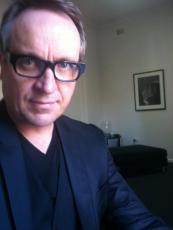 Australia Counselling member Cranston Brecht is a Sydney counsellor and psychotherapist based in Leichhardt, in the inner west of Sydney.
Australia Counselling member Cranston Brecht is a Sydney counsellor and psychotherapist based in Leichhardt, in the inner west of Sydney.
Cranston has a passion for working with a range of personality disorders, as well as helping his clients navigate the challenging issues that arise from complex Posttraumatic Stress Disorder (PTSD).
In this interview Cranston explains what complex PTSD is and how his approach is effective in helping clients overcome the painful symptoms that are related to this issue.
Here’s what he had to say to us on this topic:
Tell us a bit about your practice- where it is, who you work with and the services you offer
My practice is on Norton St in Leichhardt, Sydney. I have worked in the Inner West in private practice for around 13 years. I work with adult individuals as a psychodynamic psychotherapist in short-term and long-term psychotherapy.
How did you become interested in psychotherapy and working with complex PTSD?
I believe we are born with a natural right to good health, especially good mental health. I see that a secure sense of self and the right to a place in the world are essential building blocks to a rich and rewarding life.
Many of us can find that along the way we struggle with managing our lives in a way that is inconsistent with how we feel it could be. This may manifest in a long line of broken unfulfilling relationships, intrusive bouts of depression, low self esteem, the feeling of being stuck in situations from which we see little avenues of escape, but maybe the most important one is a pervading sense of unhappiness, a sense that things could be better but we just don’t know how to change things to a more positive situation.
Psychotherapy is an antidote to that horrible feeling of being stuck or paralysed. Fundamentally I believe that improving one person’s life can have a domino effect that influences the lives of many.
What is complex PTSD and how would someone know if they had it?
Complex PTSD is a psychological condition that results from prolonged exposure to negative environmental conditions from which the individual cannot satisfactorily and consistently escape. The situations that cause this can vary dramatically: a child who is exposed to alcoholic parents, a child who is consistently shamed, someone whose basic psychological needs (love, kindness, empathy, compassion, clear boundaries) is rarely or only conditionally met, a child who is consistently exposed to rageful outbursts, someone who is fundamentally ignored.
Obviously it is impossible to list all the different failures that lead to this condition but the fundamental ingredient is the protracted exposure to psychologically damaging circumstance from which the individual can’t escape.
How does PTSD impact a person’s life and relationships?
The impact of this condition manifest in many ways. These include:
- Depleted sense of self
- Feelings of helplessness
- History of fractured relationships
- Protracted feelings of sadness/loss/depression
- Intrusive feelings of anger/rage that the individual feels at a loss to control
- Addictions, both substance and behavioural (sex/spending/gambling etc)
- Suicidal thoughts
- Mood swings from high to low
- Excessive shame/guilt/loneliness/self destructive behaviour
How do you believe people overcome complex PTSD?
The first step in overcoming complex PTSD is acknowledging that there actually is a problem. Too often our states of being become our norm and the thought that things could actually be different can seem very foreign.
The therapeutic process centres on providing the opposite experience of what the person has generally received as part of their development. Empathy instead of dismissiveness, compassion instead of judgment, genuine attempts to understand the internal world of the person vs. contempt and control. The key element is safety that is created by creating a therapeutic environment that is empathic and consistent.
Tell us about your approach and why you believe the way you work is effective in helping people overcome complex PTSD
My training is in Self Psychology. The method puts focus on the internal world of the individual. The primary tool is empathy. Sustained empathic, explorative process result in a major shift in the individuals self.
In my practice I witness people move from closed to open, emotionally withdrawn to emotionally expansive. They develop a capacity to appropriately put themselves forward when before they were bound by shame, a greater sense that they are the authors of their own experience rather than trapped in others expectations.
They feel they have more choices “ I could never” changes into “ I can/will”. The most profound shift is the quality of their interpersonal relationships improves dramatically (spouses, children, parents, friends, workmates).
Tell us what a client can expect to experience in an initial counselling session with you
The first session is about the person’s story. What brought them to call me? They experience a position that is non judgmental, that I am there to understand their story so we can both develop an understanding of the key factors that have contributed to their distress. The empathic approach is at the forefront.
On a personal note, tell us something that you’re passionate about or love to do in your spare time
My passion is music. The great thing about music is that its all about the present, the now. There is no past or future it’s just all the little now’s connected together to create the song. Music is pure emotion. Most importantly it’s about fun. It’s a great thing.
If you would like to contact Cranston or book an appointment, please visit his Australia Counselling profile.





Leave a Reply